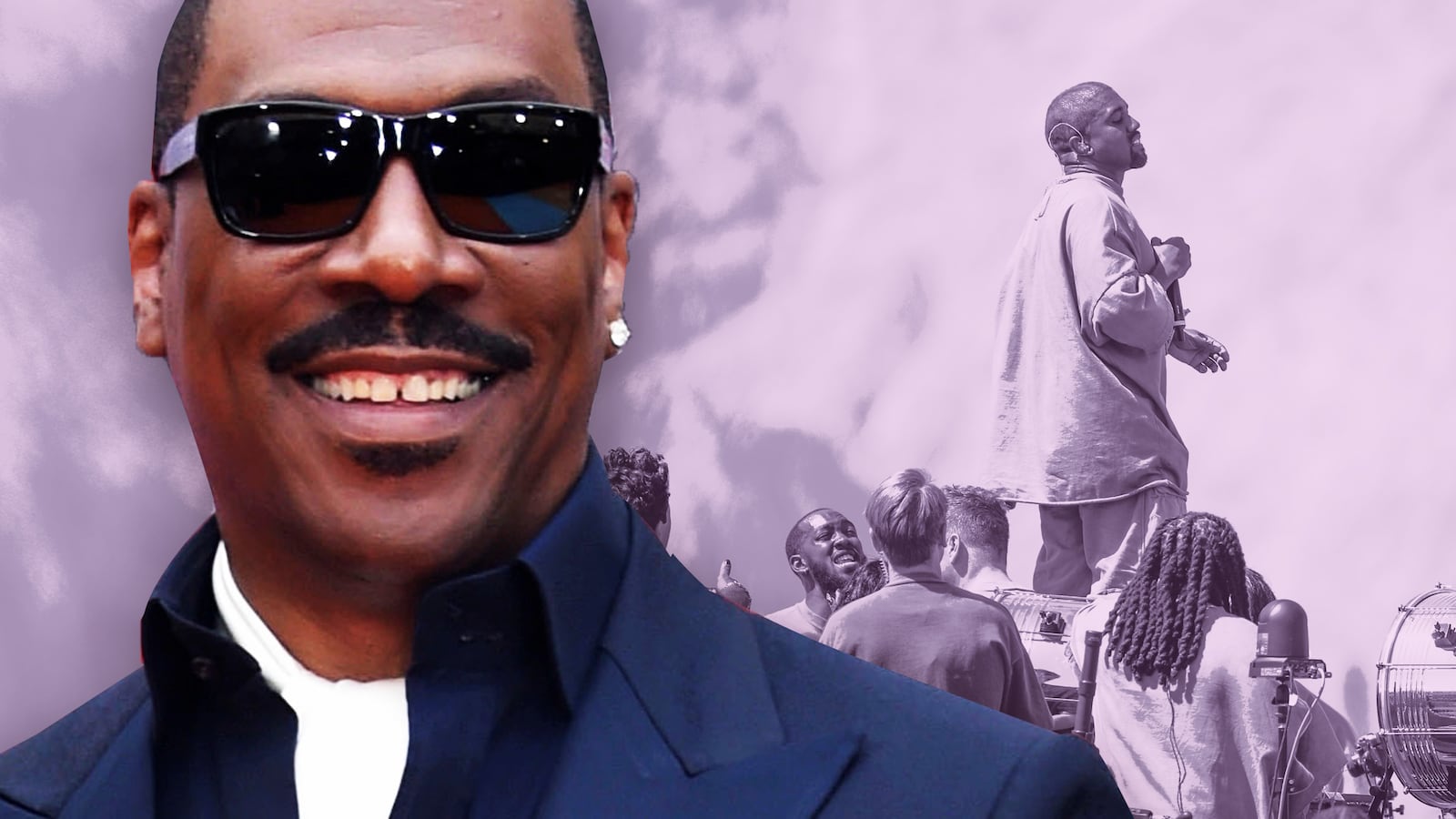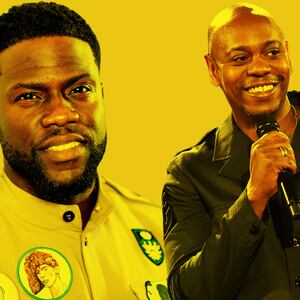Eddie Murphy. Kanye West. Two of the biggest entertainers in popular culture have been drawing attention and sparking conversation about redemption and one’s ability to evolve.
Comedy legend Murphy is in the midst of a comeback and, as he readies a highly-anticipated Netflix film (Dolemite Is My Name), a big-budget sequel to his most beloved classic (Coming 2 America), and a reported return to stand-up, he’s looked back over his past as a comic and put it in contemporary perspective. During a sit-down with The New York Times, Murphy was critical of the hateful quotes he’d spewed for yuks in his younger days—most infamously his jokes about AIDS, the gay community, and women.
“I was a young guy processing a broken heart, you know, kind of an asshole,” he said of his hit 1987 concert film Raw. “I now have a whole lifetime of experiences to draw upon.”
Eddie’s stand-up classics are famously gut-wrenching and cringe-inducing in equal measure. For every quotable line about ice cream trucks and Mr. T, there’s a hateful barb toward gays and women. The ickier parts of Raw and his 1983 HBO special Delirious have been pored over for decades. Murphy himself even admitted how wrong he’d been back in 1996, when he first apologized for his cracks about AIDS.
“I deeply regret any pain all this has caused. Just like the rest of the world, I am more educated about AIDS in 1996 than I was in 1981,” Murphy said in ‘96. “I know how serious an issue AIDS is the world over. I know that AIDS isn’t funny. It’s 1996 and I’m a lot smarter about AIDS now.”
“I am not homophobic and I am not anti-gay,” he continued. “My wife and I have donated both time and money to AIDS research. I’ve had people close to me die from the disease as well. I don’t know a person who hasn’t been touched in some way by this disease. Everybody knows somebody who is sick. Black people have been hit harder by this disease than any other group of people on the planet.”
But this week, when Murphy admitted that his old stuff is hard to watch, some people viewed it as a retreat. On the heels of heated debates surrounding comedians like Dave Chappelle and erstwhile Saturday Night Live newbie Shane Gillis, and criticism of “cancel culture” from Joker director Todd Phillips, Murphy’s statements were treated as bending the knee for the sake of public opinion. The criticism suggests that what Murphy has said about his ‘80s material is cowardly, but what person in their fifties doesn’t look back on their twenties and see how young and dumb they were?
And what’s more cowardly than not admitting when you were wrong?
Kanye West has been on a different kind of path. The entertainer has referenced a move to religiosity for a while (and his music has been peppered with religious references from “Jesus Walks” to “I Am a God”), but this year is when he actually seemed to make the leap. In the spring, he began hosting his “Sunday Services,” which featured the rapper performing gospel-fied versions of his hits for attendees every Sunday—culminating in an Easter service at Coachella. He’s promised a forthcoming duo of albums—a project called Yandhi and the hotly anticipated Jesus Is King—and an IMAX film event also called Jesus Is King due in late October that documents his much-publicized Sunday Services. Kanye’s services have featured West performing with choirs at churches around the country and have been attended by everyone from Brad Pitt to DMX. The stated goal of the shows has been to “communicate love effectively,” but some commentators have been left cold, dismissive or skeptically intrigued by the ostentatious display and star power amongst attendees. Okayplayer called the shows “him embarking in a religious aesthetic that, even in its sincerity, is just provocative and unsettling enough to fit West’s subversive persona.”
After reports of walkouts at his Sunday Service in Queens, New York, the New York Post ran a piece that featured some Christians’ criticisms of West’s services. “He may be trying to understand Jesus in his own limited way and we cannot judge another’s soul,” said Kaleina, a 68-year-old commercial real estate professional. “People who follow Christ sense something is not right with this scene.”
Kanye’s church services are the latest in the endless pomp and pretentiousness that has been his hallmark for more than a decade. He’s become almost solely an architect of spectacle—as evidenced by the fact that the services have drawn so much attention for an album he has yet to deliver—with his music serving as an appendage to his ability to get all eyes on him. That facet of who he is makes this particular endeavor less about redemption and more about affirming the kind of sway he holds over the populace. There is no apology or contrition, really. He just knows that his popularity is so massive that he can reshape his public image no matter how reckless his rhetoric.
With Murphy, on the other hand, his current reflections on his past homophobia and misogyny convey a man looking back at who he was as a youth and acknowledging his mistakes, indicative of the past few decades of growth. Anyone who has been around long enough to have regrets can understand wanting to be better than you once were, and it’s cynical to characterize his recent statements as simply a calculated ploy to engender favor during what is ostensibly a pop-culture comeback. In the case of Kanye West, his semi-rebranding as an evangelical comes with no such reflectiveness; it feels like the latest episode of a bizarre show that we’ve been incapable of looking away from for the better part of his career.
People have embraced Murphy’s statements, and it’s not hard to see why. Change for the better should be applauded and black men don’t get very many shots at redemption in America. And many have pondered across social media why is there so much cynicism directed at Kanye West when he’s embracing and promoting his faith. Throughout 2018, West was embracing and promoting Donald Trump, uttering woefully ignorant statements like “slavery was a choice,” and seemingly antagonistic to the black fan base that made him and the community from whence he’d come. With so much talk of forgiveness, it’s not hard to see why people may have been reluctant to offer clemency to West in the court of public opinion. It’s hard to forgive Kanye West when ICE is still raiding homes. It’s hard to forgive Kanye West when MAGA hats so often accompany hate. But, perhaps most significantly, it’s hard to forgive Kanye West when he hasn’t done anything to warrant it.
He hasn’t even asked for forgiveness.


